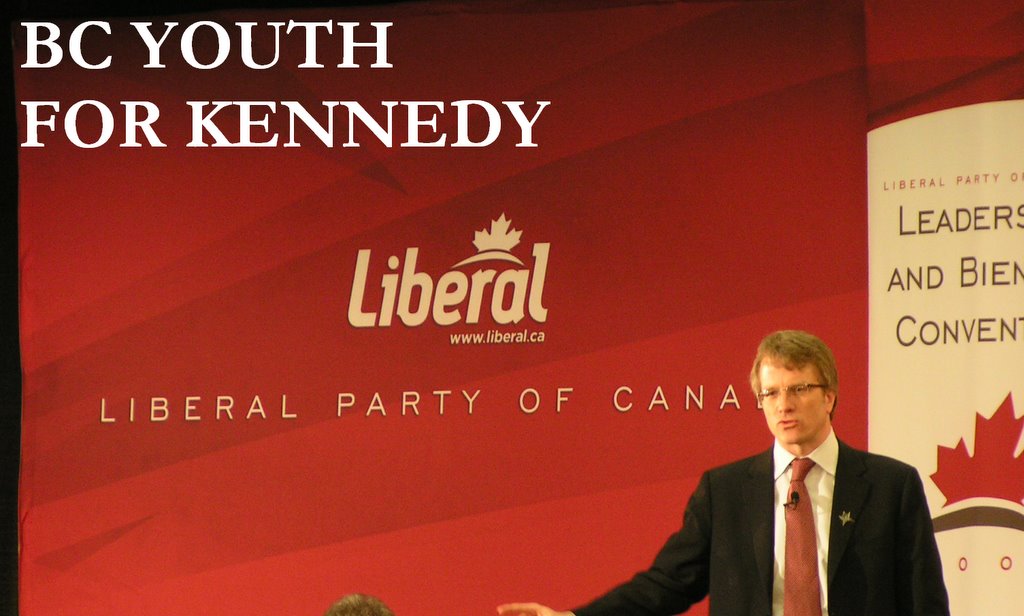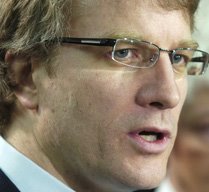Bold new ideas and the will to implement them - Gerard's vision for a renewed female equality commitment
With BC Youth Campaign Co-Chair Shelby Caravetta at his side, Gerard Kennedy announced an ambitious and comprehensive three point plan to ensure female equality and promote effective early learning this week in Vancouver. So far, the response to the fresh ideas this policy promotes has been overwhelmingly positive, with kudos coming from Liberal bloggers across the country and over 30 mainstream media outlets covering Gerard's innovative proposals and commitments. See Gerard's ideas below!

----------------------------------------------------------------------
KENNEDY CALLS FOR RENEWED PUSH FOR FEMALE EQUALITY
For Immediate Release CLICK HERE FOR BACKGROUNDER(PDF)
Says improved participation of women in Canadian economy key in a globalized world
Vancouver, BC - Liberal Leadership candidate Gerard Kennedy today unveiled his plan to improve Canadian competitiveness by bringing the earning levels of women in line with those of men, which has the potential to increase the personal incomes of women currently working in Canada by up to 21 per cent* or $174 billion* and employing 1.6 million* more working-age women.
"Increasing the economic success of women depends on three key areas: childcare, taxation and the need for collaboration among business, labour and government," says Kennedy. "The combination of results-oriented social policies with smart economic initiatives is the means to creating a new Canadian advantage in global competition."
"It's time we became more enterprising in our approach to supporting women and families to give them more choices while maximizing our workforce in a globalized economy."
Kennedy, joined by his BC youth co-chair Shelby Caravetta and Senator Sandra Lovelace Nicholas, noted that effectively addressing the challenges faced by women in the workforce would result in increased earnings for women. He also indicated that a Kennedy-led Liberal Party would put these proposals before the Canadian electorate in the next general election.
The three-point plan consists of:
• A commitment of 0.7 per cent of GDP to childcare and early learning programs in Canada by 2012. o In Canada, the share of GDP devoted to total public expenditures on formal daycare and pre-primary education is 0.3 per cent compared to the OECD average of 0.7 per cent. o Denmark spends 2.7 per cent of GDP, which is considered one reason it ranks among the top-three OECD countries with the highest female workforce participation rates.
• Review the tax rate that is charged on second-earners relative to single earners in Canada, thereby discouraging female labour force participation. Canada ranks near the top of all OECD countries with one of the highest disincentives to two-income couples. The ratio of tax rates between a second earner and a single earner is 1.4 in Canada compared to an average of 1.2 across the OECD. We will look at reducing this disparity in marginal tax rates or eliminating it entirely.
• Create a workplace issues forum that brings together business, labour and government to address:
o Flexible and adequately paid maternity leaves, including job sharing, reduced hours, optional leaves of absence, secondment programs between large and smaller employers, and co-op work arrangements with post secondary educational institutions
o Father-mother parity in early childcare programs to encourage greater participation of fathers in leave programs
o The need for more family-friendly workplaces
o Promotion of apprenticeship programs in the skilled trades to women to achieve greater participation: According to 2001 data from Statistics Canada, men accounted for 91 per cent of total registrations in formal apprenticeship programs. This figure includes food and service trades, such as hairdressers, aestheticians and cooks, plus the "other" category. When these categories are excluded, the share of males jumps significantly higher to 98 per cent of total registrations.
"Gerard knows that the economic success of women is a key factor in the overall success of our globalized economy," said MP Brenda Chamberlain. "To date, only limited links have been made between gender and the economy in our national economic policy and commitments are not widely shared by all ministries."
"Gerard Kennedy represents the next generation of leadership. He is a candidate that will stand up for the rights and preserved equality of women," said Shelby Caravetta, Gerard Kennedy Campaign, BC. "There is no other candidate that has made the kind of tangible proposals for economic parity that Gerard has made on behalf of women across the country."
"Government policies matter," says Senator Sandra Lovelace Nicholas. "We've had generations to prove that women won't achieve equal status without legal protection and the political will for progress. Gerard Kennedy is that leader."
"We must remove the barriers to success for women, for immigrants and for our First Nations, Metis and Inuit communities if Canada is to succeed in a global economy," Kennedy added.
Kennedy unveiled his Immigrant Success platform in May and Energy and Environment platform in June. His Aboriginal platform is anticipated this fall.
* According to a 2005 RBC Financial Group report, The Diversity Advantage: A case for Canada's 21st Century Economy
- 30 -
Kennedy pitches ambitious wage gap solution (from ctv.ca)
Canadian Press Updated: Fri. Aug. 25 2006 4:09 PM ET
VANCOUVER — Liberal leadership hopeful Gerard Kennedy is proposing an ambitious plan to erase the wage gap between men and women.
The plan includes dramatically boosting day care spaces, eliminating inequities in the tax system and collaborating with business and labour to make the work force more equitable and hospitable for women.
Kennedy said his plan would not only give working women the income boost they deserve, it would lure up to 1.6 million more women into the work force.
And, given that Canada's work force is aging and poised to begin shrinking, he said the country's future competitiveness may well depend on increasing the pool of female workers.
"It makes a heck of a lot of sense to encourage them," the former Ontario education minister said in an interview.
Women currently earn about 75 per cent of the income earned by men with the same education and experience.
To close that gap, Kennedy proposes to:
-Devote 0.7 per cent of Canada's gross domestic product to day care and early childhood education programs, up from the current 0.3 per cent. The increase would be phased in over the next five years. Kennedy said his plan is more ambitious - and about $2 billion more expensive - than the previous Liberal government's child care plan, which was to have cost $5 billion over five years. The Tory government scrapped the plan.
-Introduce a series of reforms to make the tax system more family-friendly and to remedy the current situation in which single-earners get more generous tax breaks than dual-earner families.
-Create a workplace issues forum, bringing together government, labour and business to examine ways to make the work force more hospitable to women, including job sharing, flexible hours, better paid maternity leaves and encouraging more women to take apprenticeship programs in skilled trades.
Kennedy said men currently make up 91 per cent of the registrants in apprenticeship programs. If female-dominated trades such as hairdressing and cooking are excluded, men account for fully 98 per cent of registrants in apprenticeship programs.
Kennedy said most Canadians likely think women are well on their way to achieving employment and pay equity. In fact, he said, statistics indicate that progress has stalled over the past few years.
This should be of particular concern to Liberals who pride themselves on being socially progressive, he added.
"We in the Liberal party should be making this one of our tenets as we go forward . . . A lot of the things we think we've done for social equity aren't done yet."











